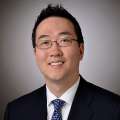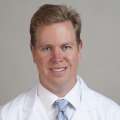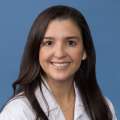Pediatric Scoliosis Program
Find your care
Call 310-825-5111 to learn more about our world-class pediatric neurosurgery services.
Scoliosis is an abnormal curvature of the spine that frequently develops during adolescent years. This abnormal curvature is usually directed to one side or the other and commonly referred to as a coronal curve. To meet the diagnostic criteria for scoliosis, this coronal curvature has to measure ten or more degrees. Most abnormal curvatures are referred to as idiopathic, meaning we do not understand or know why they occur.
Scoliosis is not a common disorder, affecting approximately two out of a thousand children. Although more boys are diagnosed with curvatures less than 10 degrees, the prevalence of clinically significant scoliosis (curvatures greater than 30 degrees) is far greater in girls versus boys. The large majority of patients will present after the age of ten, which usually coincides with a period of rapid growth that leads to progression of the spinal curvature.
Although the majority of children diagnosed with scoliosis will not require treatment, there are certain criteria that should prompt an evaluation by an expert pediatric spine surgeon. This includes children ten years and younger with spinal curvatures measuring 10 degrees or more and adolescents over the age of ten with curvatures measuring 20 degrees or more. Additionally, if a child has an atypical curve pattern or suffers from neurological symptoms, a consultation with an expert is strongly advised.
Depending on the child’s age and curve magnitude, surgical correction of scoliosis may be necessary. For patients with spinal curves measuring greater between 20 and 40 degrees, a brace may be used to slow progression of the curvature. This treatment is not always effective and success is correlated significantly with adherence. However, curvatures of the spine that measure over 50 degrees will continue to progress and surgical correction is advised.
The pediatric scoliosis program at UCLA Mattel Children’s Hospital is a world-class, multidisciplinary program designed for the unique needs of your child. At UCLA, your child will be treated by experts in their field to ensure a successful and safe outcome. Not only do we use cutting-edge technology, through our numerous, collaborative research projects at UCLA we are actively developing therapies of the future. Whether your child needs just an x-ray or state-of-the-art surgery, the pediatric scoliosis program at UCLA is here to help.
Meet Our Expert Team




